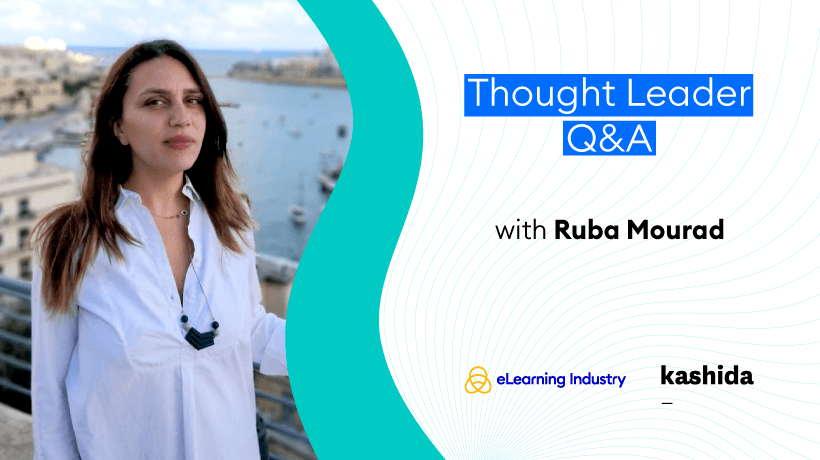Custom Learning Development Vs. Content Libraries: Making The Right Choice
Ruba Mourad is Co-Founder and Director of Learning Experience Design at Kashida, an eLearning solutions provider that has been putting people first for over a decade. Today, she speaks with us about the significance of content libraries in the world of corporate L&D, how organizations can make a stronger business case for custom learning, and ways to determine if off-the-shelf or bespoke is the best choice.
Based on your experience, what is the most common misconception surrounding custom eLearning in the corporate world? How do you feel that this prevents organizations from truly making the most of learning strategies to develop their internal talent?
Companies have undergone a significant transformation in their approach to employee development and training, so when organizations decide to invest in custom eLearning, most recognize that it might require a significant upfront budget and time for production and that they might need to go through a somewhat complicated process. However, not all organizations recognize these considerations and fail to allocate enough budget, time, and effort for the development of custom eLearning. Here emerges one of the main misconceptions, which is that an organization can increase its ROI if it simply creates custom content in a rapid process of production, only to end up with basic, generic content or boring content produced by Subject Matter Experts and professionals who know nothing about learning.
Pause and consider the following:
- Recognize that the most important investment for any organization is to first invest in developing a good learning strategy by hiring a Learning Experience Design company or building its own team of corporate learning strategists.
- Recognize that custom eLearning solutions extend beyond simply creating custom content for learning to include the design of learning strategy, custom learning content, measuring impact and the environment or ecosystem in which the learning happens.
- Recognize that custom eLearning solutions are not intended to replace face-to-face training but to look at the learning experience from a holistic perspective.
- Recognize that custom learning solutions allow the exploration and implementation of a multitude of learning approaches, including edutainment, passive learning, on-demand learning, constructive and active learning, scenario-based, problem-based learning, simulations, games, and many others.
- Recognize that investment in custom content might not be the right solution for your organization, while investing in custom eLearning solutions on a strategic scale is always necessary.
In your opinion, what is the main misunderstanding regarding content libraries in the corporate world?
The main misconception about off-the-shelf content libraries is that most employees will not make good use of the available learning content, and therefore, it does not have a great ROI. The misconception here is not inaccurate if we consider the statistics that indicate that a very low percentage of employees fully benefit from off-the-shelf content and a lower number show performance improvement that aligns with the business objectives in a directly measurable way. However, the problem with the missed Return On Investment is that most organizations will invest in off-the-shelf content because of the ease and speed at which they can roll out the learning rather than how it aligns with their actual needs. The ineffectiveness of an off-the-shelf content library is often due to a lack of alignment between a well-designed and specific learning strategy and the choice of libraries and how these libraries interact with your learning ecosystem.
How can organizations decide whether they should invest in content libraries versus custom content and learning consultancy? What is the "why and for what purpose" behind each approach?
As my lovely friend and colleague Aya Ismail, Senior LXD at Kashida, wrote, "When I introduce myself to people and tell them what I do, their first reaction often is to say, 'I find face-to-face training much better than online learning.' To me, that's like saying, 'I find screwdrivers much better than hammers!' If you hammer a nail with a screwdriver, you can't blame the screwdriver for the outcome!"
There are many advantages to utilizing off-the-shelf content libraries, including higher credibility regarding subject matter expertise and higher production value than, let's say, in-house production of content. However, to reap the benefits of a content library, it must be coupled with a solid learning strategy where the learner experience is considered beginning from the point the intended learners come across the learning, recognize the relevance of the content, and are able to demonstrate the impact on their performance and growth.
As a baseline, there are four areas organizations should consider for off-the-shelf content libraries instead of custom eLearning content but must not forgo integrating these into a custom eLearning strategy:
- Soft skills such as communication, stress management, and leadership skills
- General skills such as basic computer and software skills
- Industry or subject-specific knowledge or skills such as programming techniques and Instructional Design skills, etc.
- Compliance training, particularly industry or sector-specific that is unified across each industry or country
The beauty and advantage of custom learning experiences and custom eLearning content are that they allow an organization to precisely target objectives, and this is why it is essential to invest time and effort in the design of the custom learning experience, which can be a sophisticated multileveled experience or even a templated module that allows your experts to make rapid updates.
Custom eLearning content is not needed to cover all of an organization's Learning and Development needs; however, the following are five key areas where an organization should consider investing in the development of custom eLearning content for L&D:
- Onboarding, induction, and company culture
- Training and skills development related to proprietary processes or products
- Complex subjects not available in off-the-shelf material
- Customer training or learning
- CSR initiatives related to advocacy or development for mass reach
What is one of your standout custom eLearning client success stories?
There are many success stories that we can talk about, but I wanted to highlight one where the business needs were very clear, which was to develop a program to help the organization rapidly onboard new sales agents at scale to ensure more sales for the leading entertainment network broadcasting in the MENA region. Their main concerns were the lack of control over the consistency of the face-to-face trainings they had been relying on, costs as they are scaling up operations, and the lack of resources to deliver the trainings consistently. So, to develop the OSN Super Agent Sales Training, we created a human-centered learning experience that was designed for maximum knowledge acquisition, retention, and application. We developed a range of high-production-value learning content, including videos, interactive digital objects, infographics, quizzes, and more. The program exceeded expectations at OSN in providing quality training for their new staff, tools to help experienced staff excel in their roles, and a significant reduction in onboarding costs. The award-worthy program supported teams in 24 countries and was delivered in English. You can read our case study on the OSN Super Agent Sales Training.
For another illustrative picture of our holistic approach to learning consultancy, design, and services, read our case study on Riyali, showcasing our award-winning implementation of a custom learning solution. This case study serves as a testament to our expertise in developing tailored content that drives measurable results.
Is there a recent development project, product launch, or another initiative our readers should know about?
Our unique expertise is in providing consultancy to develop holistic learning strategies and custom content. Our approach is human-centered at its core, with an evidence-based process to tackle your organization's learning needs, including what your organization might need as an ecosystem for learning, how to measure performance and impact, and what kind of content and activities best suit your learners. Please visit our Learning Strategy and Learning Design pages, where you can explore how we approach designing impactful custom learning experiences tailored to your unique needs.
What is the first step organizations can take to identify existing L&D gaps and make a strong business case for custom eLearning solutions?
One of the most important questions for organizations to answer before commissioning custom eLearning solutions is, "What is our ultimate business need or objective?" Because, as Steven Covey puts it, "If the ladder is not leaning against the right wall, every step we take just gets us to the wrong place faster."
From that point, you can develop an understanding of your learning strategy, your purpose, what kind of content and activities you need, and if you need an off-the-shelf content library. Do you need custom eLearning content? What are the components needed to make up an effective learning ecosystem for your organization? What kind of data and data collection mechanism do you need to measure impact? The idea is to improve your Learning and Development outcomes continuously and incrementally in order to grow your team's capabilities to achieve your core business objective. An expert team of Learning Experience Designers and technologists can help you answer the right questions and develop your L&D initiatives on solid grounds. Remember, a custom eLearning solution does not only mean custom content; it also encompasses learning design and strategy.
Wrapping Up
Thanks to Ruba Mourad for highlighting the importance of Learning Experience Design for corporate L&D and offering tips for how to choose the best approach based on key areas. You can discover more about Kashida's approach by checking out their process and gain insights into their meticulous approach to creating impactful learning journeys for organizations.





